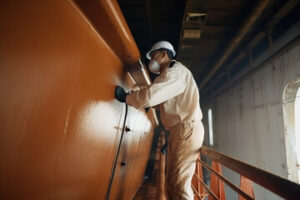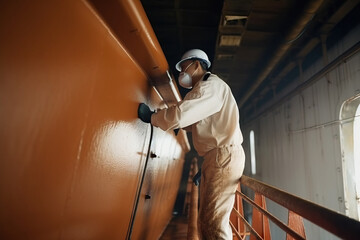Your Marine Contractor specializes in building structures and controlling shoreline erosion. These projects can pose unique risks not found on land or in standard construction jobs.
Water construction requires compliance with environmental regulations that protect marine life and ecosystems. It also requires careful attention to materials based on their ability to withstand the corrosive effects of saltwater.
Marine contractors facilitate the construction of marine structures and control shoreline erosion. The right marine contractor can ensure the project is completed on time and within budget. However, not all marine contractors are created equal. It’s essential to take the time to find a reputable marine contractor with experience in your specific area of construction.
Marine construction projects include the construction, repair, alteration, extension and excavation of fixed docks, floating docks, boathouses, mooring devices, mooring fields, seawalls, groins, jetties, rock sills, coastal bluff reshaping, marsh establishment, beach nourishment and similar stabilization and erosion control measures in State or private tidal wetlands. This also includes dredging and filling.
The specialized field of marine construction poses unique safety challenges not found in traditional on-land construction sites. Working around crowded commercial docks, piers and vessel decks that are wet, often covered in service lines, hoses, grates and planks increases the risk of slips, trips, falls and injuries to personnel. Additionally, maritime traffic interacting with marine construction vessels poses a significant risk of collisions.
In addition to the above, a marine contractor must be licensed and insured. This includes general liability, workers’ compensation and product liability insurance. Additionally, it is important to find a marine contractor that maintains an up-to-date safety manual and has qualified supervisory staff.
Many marine construction companies struggle to balance the pressure to reduce costs and preserve shareholder value with the need to provide high quality, sustainable services/solutions to their customers. This can lead to cutting corners, skimping on safety and slashing maintenance and other “expenses” until work picks up. This can ultimately jeopardize the safety and integrity of their customers’ projects.
Experience
The first thing to look for when selecting a marine contractor is their experience in the industry. Unlike a home building contractor, marine contractors specialize in coastal and freshwater construction services, including docks, seawalls, boat lifts, bulkheads, and other structures. They also have extensive experience with marine transportation, such as dredging and barge operations.
Having this specialized expertise in the field will allow a marine contractor to build projects more quickly and at a higher level of quality than general contractors would be capable of. They will understand what materials and equipment to use based on your specific project requirements. They will know what permits you will need, how to obtain them, and any regulatory issues you may have to address.
When considering a marine contractor, look for one that is financially stable and has a history of completing projects on time and within budget. You will also want to know whether the company regularly participates in industry forums and working groups, and if they are leaders in advancing safety and higher standards in the field. This will give you an indication of the level of commitment they have to their employees and customers.
Marine contractors are tasked with performing some of the most risky work in the world, and they must be especially careful to manage their on-the-job exposures. Getting swept off your feet by wave action, being struck by passing water traffic or working on a barge that is swaying with the current of a waterway presents unique dangers that must be carefully managed.
In addition, the maritime industry has been challenged with a growing shortage of skilled workers, which translates to increased pressure on those who are still in the workforce to handle the demanding work load. This is a major issue, and the best way to mitigate it is by having a comprehensive insurance program in place.
This includes marine general liability, products and operations, pollution, commercial hull, and protection and indemnity coverages as well as umbrella insurance policies. These policies will help to protect the marine contractor from unforeseen losses that could shutter their business or sink their profits.
Insurance
Marine contractors are in a unique position and are exposed to major perils that can halt business operations and sink profits. Tailored insurance helps them to recover.
Construction work on water and around docks requires specialized equipment that is expensive to repair or replace in the event of an accident. Additionally, a marine contractor is in constant contact with a large volume of vessels and may be at risk of collision liability.
Having the right insurance coverage can help protect marine contractors from costly lawsuits. For example, if a marine contractor accidentally causes pollution damage to plants and animals that rely on the water to survive, the company could be held responsible for paying significant fines and cleanup costs. That’s why it is important to include environmental insurance as part of your marine contractor insurance policy.
In addition to marine general liability, a marine contractor should have equipment coverage for owned, leased and hired equipment. Travelers inland marine contractors’ equipment insurance offers broad protection for all your machinery, including loaders, excavators, cranes and other heavy equipment. Our local account executives understand your projects and have the ability to tailor limits to meet your specific equipment needs.
Another important component of a marine contractor’s insurance is workers’ compensation. A marine contractor that is not properly covered can face severe consequences should an employee be injured on the job. With a workers’ compensation policy, the company can ensure it has enough funds to pay employees who are unable to work due to an injury.
Marine contractors can also benefit from additional coverage for property in transit, legal liability and marine operator’s liability. These are often included in all-lines policies that bundle marine and commercial property, general liability, auto, workers’ compensation and umbrella insurance into one policy. This allows marine contractors to streamline their claims management and receive competitive pricing benefits.
Marine contractors have to deal with a wide range of governmental regulations that can impact their businesses in unexpected ways. For instance, if they are not up to date on the latest building codes, they may have to spend additional time and resources making sure they comply. In addition, a sudden drop in economic conditions can force marine contractors to cut safety, maintenance, personnel and insurance expenses. Stable private companies with stable leadership are better positioned to survive downturns and continue to deliver on their commitments to clients.
References
When looking for a marine contractor, it’s important to ask for references and testimonials from past customers. This will give you an idea of the quality of their work and whether they are worth hiring. You should also look for reviews online to find out what other customers have said about the company’s services.
It is a good idea to choose a marine contractor who has extensive experience in the construction of docks, seawalls, boat lifts, and other structures related to water. A marine contractor with this type of expertise is more likely to complete your project quickly and efficiently, saving you time and money in the long run. They will also have a better understanding of the various factors that may impact the construction process and can provide you with useful advice and guidance.
Marine contractors are vital to the smooth running of maritime business, contributing to efficiency, sustainability and compliance with rapidly evolving regulation at state, federal and international levels. They rely on new technologies such as Sinay’s high-quality metocean data and software to stay competitive, and need to be able to adapt their business models to rapidly changing market conditions.
Choosing the right marine contractor can make or break your construction project. While many general and inland contractors may offer to handle marine projects, they often lack the technical knowledge of dealing with different aspects of these complex jobs, such as design, boat lifts, jetties, bulkheads and environmental factors. Working with a specialized marine contractor will ensure that you get quality results that are worth the investment.
Insurance coverage is another important factor in selecting a marine contractor. When you’re building a dock, a seawall or any other marine structure, you want to be sure that the contractor has sufficient insurance coverage in case of an accident or other unforeseen circumstances. Insurance can protect you from financial loss if something goes wrong during the construction process, and it will also help to cover medical expenses for any injuries that may occur.
Contractors involved in marine-related projects need customized insurance coverage that isn’t available through standard policies designed for land-based businesses. An agent experienced in ocean marine and construction insurance will be able to create a tailored package that includes coverage for marine risks, along with possible coverages that may be unnecessary for a particular job.
